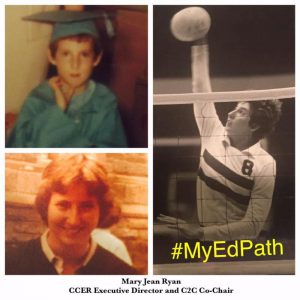This blog was written for the Cradle Through College Coalition’s #MyEdPath project. To learn more and to share your story and photos, visit c2ccoalition.org.
 I am one lucky person, especially when it comes to education. My mom and dad were both public school teachers. Books were abundant as were trips to the library. I had lots of freedom to play and learn from running around with the neighborhood kids. I got a good dose of formal “quality early learning” at a school run by a neighbor. She took me in as a favor to my mom. This start helped me understand the importance of access and opportunity and set me on an educational path to make sure others have the same chance at life.
I am one lucky person, especially when it comes to education. My mom and dad were both public school teachers. Books were abundant as were trips to the library. I had lots of freedom to play and learn from running around with the neighborhood kids. I got a good dose of formal “quality early learning” at a school run by a neighbor. She took me in as a favor to my mom. This start helped me understand the importance of access and opportunity and set me on an educational path to make sure others have the same chance at life.
In my grammar school, which was right down the street, I had some extraordinary teachers. One named Allan Dressel really stands out. He used project-based instruction methods to teach junior high social studies. We took on real life problems in our neighborhood and tried to get the City of Chicago to take action. We did mock court cases on the issues of the day. We studied elections in real time. We looked forward to reading the paper each day because we started to see ourselves in the workings of our city. He encouraged us to challenge and reject the virulent South Side racism. Mr. Dressel organized classroom exchanges so white and black kids could meet each other, attend school together and begin to break down some of the massive barriers and prejudice. He taught us to work for social justice and to take action.
In high school I had another amazing teacher, a young nun named Sister Avis. Avis wanted to be a Jesuit priest. She gained admission to the theological seminary to prepare for the priesthood and was an outstanding student. She often gave the homily at school masses. One problem: Avis was a woman which prevented her from entering the priesthood. Her view was that she would do her part to the fullest and get the training required to be a priest. She felt the calling. She wanted to serve as a priest and though she was excluded she never accepted that. She taught us to fight for social justice and reject the politics of division and she cared about her students and got to know us as people. She often rescued me when I got crosswise with the school’s administrators. Then, like now, I tended to rebel against systems and rules that seemed unfair to students.
Another major part of my education path came from playing volleyball. I started in 6th grade and never stopped playing until years after college. When I began I was put on the worst team—Team C—and I was ranked the “12th man,” a very different meaning from the Seattle Seahawks context. There were 12 girls on each team. The kids themselves ranked the players from good to bad (not very gentle treatment of the child ego). Being ranked No. 12 was the bottom of the barrel. I worked very hard to turn that around. I banged the ball against the neighbor’s brick wall. My dad threw balls at me in the yard. I begged my teammates to play over laundry lines or anything resembling a net. We played and practiced on asphalt and wore coats and mittens as we played through the winter.
At the same time as I was in a gym, Congress was debating and enacting Title IX, the civil rights law demanding equal treatment for women in sports. The timing of this law made a huge difference in my life opportunities. The year I was to enter college was the same year Title IX compliance was mandated for large university athletic programs. As a result of Title IX, I was awarded an athletic scholarship to Georgetown University. Having a chance to learn about a world beyond the parochial confines of the Chicago South Side and go to a place like Georgetown was life changing. The academic rigor and richness was amazing. I met people from all over the world and was challenged in every way. I majored in American studies and put a focus on learning about cities and immigration—topics about which I remain a devoted student to this day. Georgetown’s philosophy is similar to that of Sister Avis and Mr. Dressel and at each stage of “my ed path” the emphasis was put on public service and the importance of working for social justice.
I have had the privilege of receiving so much opportunity and have been extremely fortunate. I was aided by countless family, teachers, friends and neighbors. My passion as an adult is to work with others to help improve access and opportunities for all children—from early learning through higher education. Great education opportunity should be the norm—not a matter of luck, lottery or ZIP code.
Mary Jean Ryan is Executive Director of the Community Center for Education Results. CCER supports the Road Map Project, a community-wide effort aimed at improving student achievement in South King County and South Seattle.
Posted in: Other